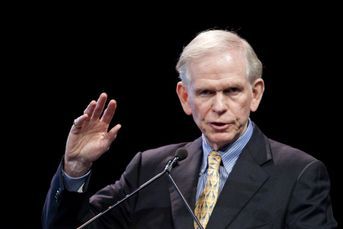Fama’s Nobel work shows that active managers are fated to lose
Index giant Vanguard built its business on the economist's work.
The work that earned Eugene Fama the Nobel Prize in economics provided the intellectual foundation for index-tracking funds, which have upended stock picking as investors have abandoned active money managers.
Mr. Fama, 74, has argued that financial markets are efficient and that stock price movements are unpredictable, making it impossible for even professional money managers to gain an advantage. His conclusion that investors would be better off in low-cost funds that track the market’s performance helps explain the success of The Vanguard Group Inc., the biggest U.S. mutual fund company, as well as the rise of passive investments, which had more than $2.6 trillion in U.S. assets between exchange-traded funds and mutual funds at the end of 2012.
“His work has been seminal,” F. William McNabb III, Vanguard’s chief executive, said Monday in an interview with Tom Keene and Sara Eisen on Bloomberg Radio’s “Bloomberg Surveillance.” “A lot of what we have done is based on that work.”
Funds that mimic the performance of markets gained momentum after 2008 when the S&P 500 fell 37% and investors lost faith in the ability of stock pickers to insulate them from losses. Over the past five years, index funds have been the most popular choice for investors, with assets in U.S. ETFs almost tripling in that period. Investors have pulled about $284 billion from actively managed equity mutual funds, while pouring $243 billion into stock index mutual funds since the end of 2008, data from Morningstar Inc. show.
“Index funds have gone from a wacky fringe idea to the point where they are now viewed as the default investment option for many people,” Russel Kinnel, director of mutual fund research at Morningstar said in an interview.
Some of the most highly regarded active equity managers stumbled in the past decade, a period that included the biggest stock market slump since the Great Depression. Bill Miller, the money manager best known for beating the S&P 500 for a record 15 years before the streak ended in 2006, was hurt in 2008 by a heavy bet on financial stocks. His Legg Mason Capital Management Value Trust (LMVTX) slumped 55% in 2008.
Mr. Fama, a professor of finance at the University of Chicago, concluded in research done in the 1960s that financial markets are efficient, which meant that asset prices already reflect all relevant information. From that basic idea, it follows that trying to beat the market is an exercise in futility.
Vanguard launched the first U.S. index fund in 1976. The Vanguard 500 Index Fund (VFINX) today has $132 billion. Vanguard, which manages $2.3 trillion, in 2010 overtook Fidelity Investments as the biggest U.S. mutual fund manager.
‘Seminal’ work
“The trend is likely to hold until we see a market in which individual stock picking is rewarded,” Geoff Bobroff, a mutual fund consultant, said in an interview.
Mr. Fama has had a more direct impact at another mutual fund firm: Dimensional Fund Advisors LP, where he serves as a board member and consultant. The firm, started in 1981, has over $300 billion in assets and ranks as the eighth-largest U.S. mutual fund firm, Morningstar data show.
“Professor Fama’s groundbreaking work on asset pricing and markets inspired the founding of Dimensional,” the company wrote Monday on its website.
David Booth, Dimensional’s founder, was a student in Mr. Fama’s finance class in 1969.
“He was the first person I called when I started the firm,” Mr. Booth said in an interview.
Mr. Fama’s research forms the basis for Dimensional’s funds, which differ from traditional index funds by putting more emphasis on finding small-cap stocks, stocks trading at low prices and firms with higher profitability, Mr. Booth said. Mr. Fama’s research showed that those factors are critical to return on investment.
In a 2010 paper he co-wrote with Dartmouth College finance professor Kenneth French, Mr. Fama raised the question of whether active managers are lucky or skillful. He determined that only 3% demonstrated skill, which, he found, is what would be expected purely based on chance.
“The research shows that it is impossible to pick people who can beat the market,” he said in a November 2010 interview with Bloomberg News.
Buffett’s record
Berkshire Hathaway Inc. Chairman Warren Buffett’s investment success over decades has often been used by critics of efficient markets to show that it is possible to outperform indexes. From the end of 1976 to June of 2013, Berkshire shares gained 23% a year, compared with 11% for the S&P 500. Mr. Fama, in a 2012 interview, said he considered Buffett more of a businessman than an investor.
“I don’t know if Warren Buffett is just lucky or skillful,” Mr. Fama said in the interview, posted on Dimensional’s website.
Not everyone agrees with Mr. Fama’s conclusions. Since 1981, Mr. Fama’s fellow Nobel laureate Robert Shiller has been at the forefront of economists chipping away at the theory of efficient markets. His research showed that investors can be irrational and that assets from stocks to housing can develop into bubbles.
Seth Klarman, founder of The Baupost Group LLC, a hedge fund, told his investors in a January 2012 letter that the efficient-market theory is plausible at first blush. Mr. Klarman, whose firm manages about $29 billion, argued that investors are far from rational and that their herdlike behavior can create asset prices with little relationship to underlying fundamentals.
“Conceptually, this picture makes sense,” he wrote. “In practice, it simply doesn’t hold up.”
The Capital Group Cos. Inc., a $1.2 trillion money manager, released a study in September that found that stock-picking mutual funds outperformed their benchmark indexes in the majority of almost 30,000 periods examined over the past 80 years. The company has suffered redemptions in recent years as investors have defected to index mutual funds and ETFs.
“There can be a significant advantage to active investing,” James Rothenberg, chairman of Capital Group, said last month in an interview with Bloomberg News.
Over the past 10 years, 41% of actively managed U.S. stock funds beat their benchmark indexes, according to data from Lipper Inc.
The popularity of indexing has grown steadily over the past decade. At the end of 2012, index mutual funds accounted for 15% of the assets in U.S. stock and bond funds, up from 9.6% at the end of 2003, Morningstar data show. Among stock funds, index funds accounted for 21% of assets as of Dec. 31; among bond funds, they represented 9.1% of assets.
U.S. ETF assets have almost tripled since the end of 2008 to $1.5 trillion, according to data from the Investment Company Institute. The vast majority of U.S. ETFs are in indexed products. Unlike mutual funds, ETFs can be traded throughout the day like stocks.
(Bloomberg News)
Learn more about reprints and licensing for this article.








